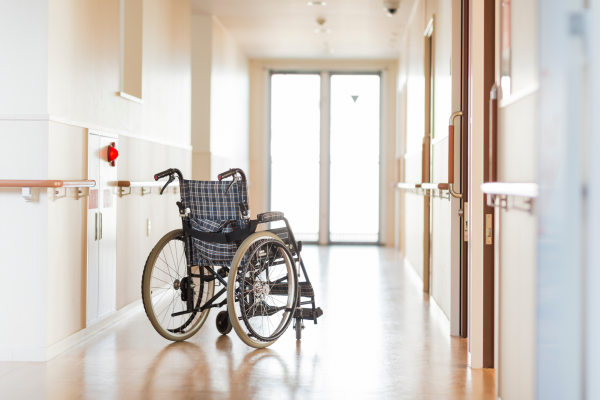“I think all of the people I’ve spoken to in my advocacy journey, the reason they are involved is because they don’t want what happened to them to happen to other people. That is the guiding thing. I don’t want anybody else to go through what my parents went through. I think that is really critical.” (Care partner and family member, CPFM10 – a participant in this project).
These words could have been my own, as it is my deep-felt belief that care partners must be the voice for our loved ones living with dementia. Through the continued advocacy against the violation of human rights for people living with dementia, we can protect others from living through the experiences that our family and friends have endured.
 In this post, I’ll be referring heavily to the groundbreaking work of co-authors Linda Steele and Kate Swaffer and their project, “Reparations for harms experienced in residential aged care.” This is an Australian case study that aims to serve as the first step in the discussion of the potentials, complexities and limitations of reparations as one approach to addressing harms in aged care.
In this post, I’ll be referring heavily to the groundbreaking work of co-authors Linda Steele and Kate Swaffer and their project, “Reparations for harms experienced in residential aged care.” This is an Australian case study that aims to serve as the first step in the discussion of the potentials, complexities and limitations of reparations as one approach to addressing harms in aged care.
We first spoke about this project in June 2022. Today, we’ll provide an update on the project and some of its key findings. In part two, we’ll look at how we can use this data to improve dementia care in the US, including addressing some key barriers to accessing these kinds of reparations.
Project update:
The project provides a detailed analysis of the harms experienced by adults with dementia in residential care, and examines possible avenues for redress and reparation. It identifies systemic issues that may have contributed to the harm, along with specific strategies for community-led advocacy and action.
Swaffer and Steele utilise their legendary academic skills and scholarly prowess to provide thought-provoking, emotive and compelling arguments, which now form the basis of this project. The key focuses of this project include:
- bringing awareness to the need for reparation
- changes to policy and practices around access to justice
- immediate improvements in the care and treatment of people with dementia
- longer term action on bettering community-based support.
Their work is a call to action for the sector. The project has been positively received within the dementia care sector, with suggestions for further research being offered by many stakeholders.
Defining ‘reparations for human rights violations’:
The authors define ‘harms’ as not being limited to isolated incidents perpetrated by careless staff. Instead, this project looks at the structural and systematic harms that facilitate human rights abuses at all levels, including the societal attitudes towards aged care, regulatory frameworks, the political economy and more.
Other key harms to people living with dementia include:
- lack of public funding for community-based initiatives
- lack of availability of acceptable housing when people with dementia can no longer live with their families
- notable community stigma around aging
- lack of support for unpaid carers – including emotional and psychological support.
 For other groups that have been wronged by society, the Australian government has paid reparations, which are compensation payments to individuals or groups for the harm they have suffered. This is an important recognition of past injustices.
For other groups that have been wronged by society, the Australian government has paid reparations, which are compensation payments to individuals or groups for the harm they have suffered. This is an important recognition of past injustices.
People living with dementia and their loved ones have yet to receive any reparations for the injustices they experience in daily life. In failing to address these harms, our society continues to condone them.
Key findings:
The report found many common beliefs amongst all stakeholders about the need for reparations. This includes recognition of the human rights abuses faced by people living with dementia and support for concrete steps to address these issues.
It was found that:
- Many people aren’t believed when they raise concerns about their care or the care of their loved ones.
- It is vital that the community learns the truth about what happens in dementia care.
- The government has not said sorry for past human rights abuses.
- There is no financial compensation for those who have suffered human rights abuses.
Four themes of reparations:
The report found that there were four key themes in the discussion of reparations:
- RECOGNITION: What it is like living in aged care and the injustices faced by people living with dementia need to be acknowledged.
- ACCOUNTABILITY: The government and care providers need to be held accountable for what happens in aged care.
- CHANGE: The government needs to make changes to protect the rights of those living in aged care.
- NOW: The change needs to happen now, as injustices are occurring daily.
 Final thoughts:
Final thoughts:
This report recognizes that there is a failure to uphold critical human rights for people living with dementia, including malnutrition, social isolation, verbal abuse, physical and sexual assault, lack of access to adequate healthcare and many more. We’ve summarized the key findings in regards to the attitudes and experiences of carers and their loved ones, as well as the attitudes towards reparations. In part two, we’ll discuss the findings and recommendations in more detail and discuss how we can use this study to improve dementia care in the US.
WHO: Coauthors Kate Swaffer and Linda Steele
Kudos and deep-felt thanks to Kate Swaffer and Linda Steele, the Dementia Justice researchers whose tireless efforts help to advance the human rights of people living with dementia.
 Linda Steele is an associate professor in the Faculty of Law, University of Technology Sydney, and an honorary fellow at the School of Business and Law, University of Wollongong, Australia.
Linda Steele is an associate professor in the Faculty of Law, University of Technology Sydney, and an honorary fellow at the School of Business and Law, University of Wollongong, Australia.
 Kate Swaffer is an independent researcher and author, a global campaigner for the rights of people with dementia and older persons, and an honorary associate fellow at the Faculty of Science, Medicine and Health, University of Wollongong, Australia.
Kate Swaffer is an independent researcher and author, a global campaigner for the rights of people with dementia and older persons, and an honorary associate fellow at the Faculty of Science, Medicine and Health, University of Wollongong, Australia.
Kate is frequently referenced in this website, ABeautifulVoice.org. Her bio can be found on our Influencers page as one of “13 Influencers” whose work resonated with the ranchers’ alternative lifestyle. Find Kate’s bio here.
Funding: The research was paid for by Dementia Australia Research Foundation.
Citation: Linda Steele and Kate Swaffer, Reparations for Harm to People Living with Dementia in Residential Aged Care – Executive Summary (University of Technology Sydney, 2023)
Blog post co-authors: This review was co-authored by Susan Troyer and Kia Marie @Fiverr.com where she is a full-time writer in Australia. Previously, she worked as a dementia nurse in Australia.


Leave A Comment